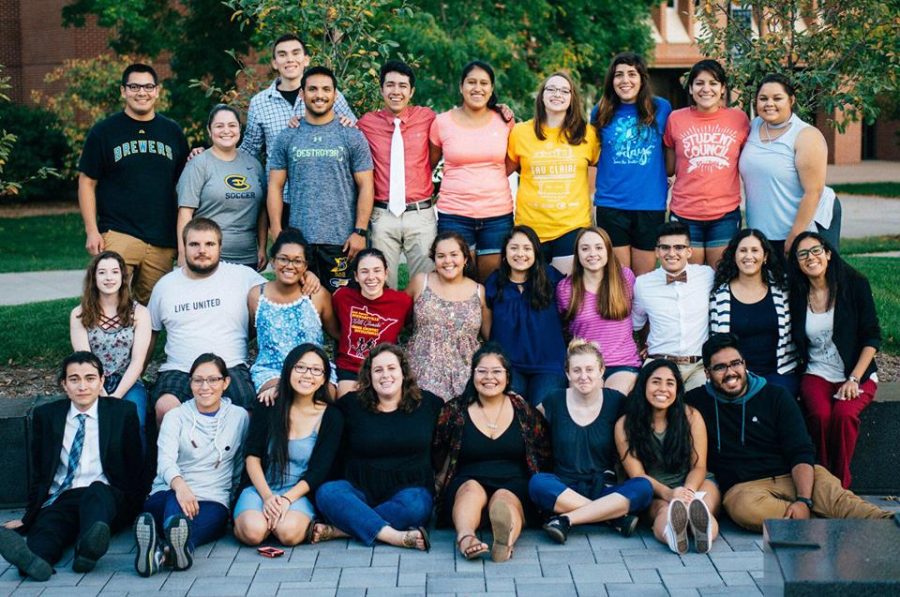Student Organization of Latinos gives students a sense of community and culture
The group creates a home away from home for Latino/a students at UW-Eau Claire
More stories from Scott Procter
Photo by SUBMITTED
Student Organization of Latinos (SOL) meets every Thursday to foster an environment where students can be comfortable and be around people of similar identities.
Imagine being asked, “When are you going home?” because someone thought you were an international student. That’s what Alejandra Estrada, a senior studying public history, heard often during her first two years at UW-Eau Claire.
But, Estrada is not from a foreign country or here visiting the Midwest for a stint of time — she is a Latina student from Madison, WI.
Estrada is also the president of Student Organization of Latinos (SOL) at Eau Claire, a group aimed to promote and support cultural, social and academic interaction among Latino/a students, faculty, alumni and local residents of Latin American origins, according to the group’s mission statement.
Because issues dealing with race plague our country and even the White House, resources for minorities at a predominantly white institution can be uncertain, Estrada said. Since its re-establishment four years ago, SOL has provided an outlet for about 35 students to discuss their places and identities on this campus and in the United States.
“We talk about it,” Estrada said. “You can have these conversations with other people, and you should, but sometimes you just need people who get it without explanation or more emotional labor.”
SOL was created for that very reason she said; to give Latino/a students a place to be around people with similar backgrounds to help curb some of the loneliness minority student can feel on a campus such as Eau Claire.
Emmanuel Castellanos, a junior psychology student and the organization’s secretary, said a big step this university can make toward diversity and inclusion is recognizing that Eau Claire is not a diverse campus. Castellanos acknowledges that although SOL has about 35 members who come to meetings, the number is only a miniscule fraction of the entire student population at Eau Claire.
“From my experiences, it is always hard to try to find people of similar identities and trying to go through the whole college experience while not having people that are like you to be there for you as well,” Castellanos said.
With the Hispanic population of Eau Claire set at 2.5 percent, finding similar faces on campus that truly “get it” is challenging for Latino/a students.
This challenge was made even harder when the university let go of the Latino Retention Coordinator in the Office of Multicultural Affairs after the 2014-15 school year, Estrada’s first year.
For two years, Estrada and students like her didn’t have anyone advising, advocating or planning events for them. During this time period, there weren’t any events planned for Hispanic Heritage Month.
A lack of support or initiatives aimed at inclusion by faculty can leave minority students feeling frustrated, as Castellano can attest to.
“I think we’re seen as a percentage and not as a population,” Castellanos said. “We’re seen as numbers to boost how this university looks and not necessarily care about what our experiences are on this campus.”
At the end of the day, Castellanos said, there just hasn’t been enough faculty on campus to advocate for him and students like him therefore the brunt of that work has fallen on the shoulders of the Latino/a students. Apart from being regular college students and trying to be leaders on campus, he said Latino/a students oftentimes have to advocate for themselves and put in extra work to feel included.
This year, the position of Latino Retention Coordinator has been filled, a move Estrada said she wishes had come earlier, because she is now in her senior year and is graduating in the spring.
Hispanic Heritage Month will also be celebrated again this year with a banquet in commemoration of the generations of Hispanic Americans who have positively enriched America.
While there have been moves made in the right direction, there is still much work to be done. Estrada said an activity the group often does at their meeting is share their “highs and lows.” One specific day that stuck out was when President Trump was elected, specifically when he came to campus.
“It was rough,” Castellano said. “No one had faith or hope for what was coming next.”
Last Tuesday, members of SOL set up a table in the Davies Student Center on campus to lobby for the Development, Relief, and Education for Alien Minors (DREAM) Act of 2017. The DREAM Act provides a pathway to legal status for undocumented youth who came to the United States as children.
President Trump decided last month to rescind The Deferred Action for Childhood Arrivals (DACA) program that provided protection from deportation of young people who were brought to the United States as children. The passing of the DREAM Act would make DACA’s protection permanent, a decision that could affect hundreds of thousands of Latinos/as.
During their two hours in the Davies Center, SOL helped send out 100 postcards to local and state representatives in support of the DREAM Act.
“If we didn’t actively create a space for ourselves within SOL,” Estrada said, “we would be in the margins.”


